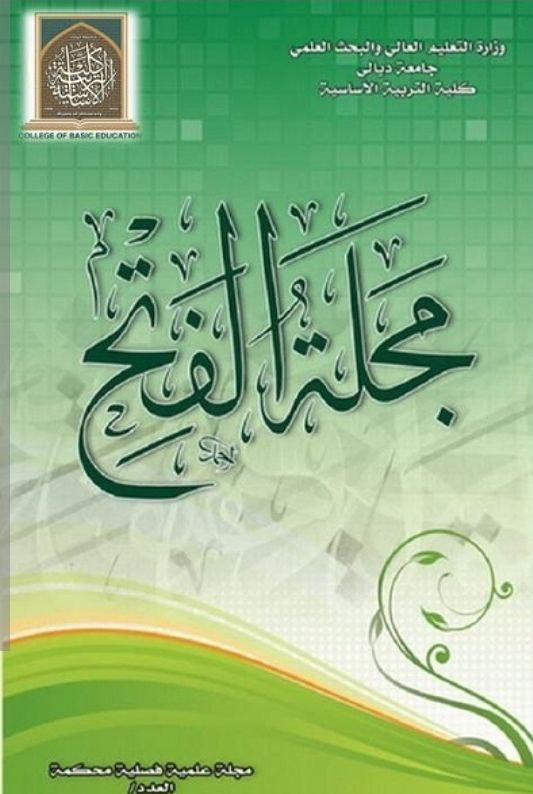The psychological and educational dimension in Iraqi popular proverbs
Abstract
Proverbs are regarded a national and people's lifetime
experiences describing hopes and pains in life and its
psychological phenomena that are deeply rooted in the
reality of Man and society. Proverbs are, in addition, of the
minutest issues indicating peoples' thinking and conventions.
Colloquial proverbs are suitable to be a social study because
they are among the most reliable sources for psychological
researches. On the social side, they comprised folk traditions
and local values as well as remarks included in them to
various industries, careers and living conditions. From the
psychological side, proverbs contain inclinations of people
in times of peace and fear.
Therefore, the problem of the paper is to try answering the
following question: are there educational and psychological
dimensions in Iraqi folk proverbs?
Moreover, parables and aphorisms are rules of peoples'
experiences during various successive epochs. They indicate
the sentimental sharing of feelings of pain, happiness,
distress and prosperity.
The paper aims at identifying the educational and
psychological dimensions of Iraqi folk proverbs.
Furthermore, the researcher has adopted the descriptiveanalytical approach because it is the most suitable for
information and data gathering from the population of the
ِhttp:www.alfatehmag.uodiyala.edu.iq
333
study in figuring out the educational and psychological
dimensions in Iraqi folk proverbs.
The researcher concluded that Iraqi folk proverbs are replete
with psychological dimensions that are signifying the
psychological disorders in an individual through his
behavior in addition to the possibility of diagnosing the type
of psychological disorder like megalomania, phobia, passive
personality disorder and the like. They also full of
educational guidance as another dimension of proverbs as
warning from committing mistakes, a call for conduct
amendment, being ethical, consulting others, stimulating
self-reliance, accepting tutors and mentors rigidity as well as
other positive educational instructions.
References
ٔ. كّذ ، ٌ١غ وش٠ ُل7 : )ٕٓٓحٌفىش حٌظشرٛٞ حالعالِٟ فٟ حٌظؼٍُ ٚحٌظؼٍ١ ُ
ٚحالسشخد، فْٕٛ ٌٍطزخػش، رؼمٛرش ، د٠خٌٝ ، حٌؼشحق
ٕ. حٌلٕفٟ ،حٌش١خ ؿاليلٖٙ7 : )ٔحالِؼخي حٌزغذحد٠ش ، ؽٔ، ِطزؼش حعؼذ ، رغذحد ،
حٌؼشحق
ٖ. حٌذٌ١ّٟ، عالَ حكّذلٕٙٓٓ(: حالِؼخي حٌؼشر١ش حٌمذ٠ّش دسحعش فٟ وظخرٟ ِـّغ
حالِؼخي ٌٍّ١ذحٟٔ، ٚحٌّغظمظٟ فٟ حِؼخي حٌؼشد ٌٍضِخششٞ دسحعش ِٛػٛػ١ش ٚفٕ١ش
،حؽشٚكش دوظٛسحٖ غ١ش ِٕشٛسس ،وٍ١ش حٌٍغش حٌؼشر١ش ٚػٍَٛ حٌمشحْ /حٌـخِؼش حالعالِ١ش
، رغذحد.
ٗ. سفؼض، ػطخ سفؼض ل798 ِٓ : )ٔحِؼخي حٌزخد٠ش ٚحٌش٠ف ، ِطزؼش عٍّخْ
حالػظّٟ، رغذحد
٘. صٌضٌش ،ِلّذ طخدقلٙ79ِ : )ٔـّغ حالِؼخي حٌؼخِ١ش ٚحٌزغذحد٠ش ، ِٕشٛسحص دحس
حٌىظذ حٌؼمخف١ش ، ؽٔ، حٌىٛ٠ض .
ٙ. حٌغؼذٞ، حٌش١خ حرٟ ػزذ هللا ػزذ حٌشكّٓ لٕٔٓٓ( : ط١غ١ش حٌىش٠ ُحٌشكّٓ فٟ
طفغ١ش والَ حٌّٕخْ ،ؽٕ، دحس حك١خء حٌظشحع حٌؼشرٟ، حٌغؼٛد٠ش.
.حٌؼغىشٞ ، حرٟ ٘الي ،ل788 :)ٔؿّٙشس حالِؼخي ، ؽٔ، دحس حٌىظذ حٌؼٍّ١ش
،ر١شٚص
.ػّخس ، كخسص لٕٙٓٓ( : حالِؼخي حٌشؼز١ش ٚدٚس٘خ فٟ طّٕ١ش حٌظفى١ش حٌٕخلذ ٚحٌم١ ُ
ٌذٜ طالِ١ز حٌلٍمش حالػذحد٠ش ِٓ خالي طؼٍ١ ُحٌذسحعخص حالؿظّخػ١ش ٚطؼٍّٙخ ، ِـٍش
ٔٙش حٌؼٍُ ، عٛ٘خؽ، ِظش
.حٌؼٕظ١، ًفٛصٞلٕ79 : )ٔر١ ٓحٌفٍىٍٛس ٚحٌؼمخفش حٌشؼز١ش ، دحس حٌٙالي ٌٍطزغ
ٚحٌٕشش ،حٌمخ٘شس
ٓٔ. حٌى١الٟٔ، حرشح٘١ ُلٗٙ7 : )ٔحٌزظخثش ٚحٌزخخثش الرٟ ك١خْ حٌظٛك١ذٞ، ِطزؼش
دِشك، عٛس٠خ.
ٔٔ. ِلغٓ، ِٛفك ح٠ٛد، ٖٕٔٓ: حٌظلش حٌٕفغ١ش فٟ حٌفىش حالعالِٟ، ِطزؼش
ؿخِؼش د٠خٌٝ، ِلخفظش د٠خٌٝ.
ٕٔ. ٠ؼمٛد، حِ١ ًرذ٠غ لٕ٘ٓٓ( : ِٛعٛػش حالِؼخي حٌشؼز١ش ، ِـٍذ حالٚي ،ؽٕ ،
دحس ٔٛرٍظ ، ر١شٚص ٌزٕخْ.
Downloads
Published
How to Cite
Issue
Section
License
Copyright (c) 2023 مجلة الفتح للبحوث النفسية والتربوية

This work is licensed under a Creative Commons Attribution 4.0 International License.
حقوق النشر والترخيص
تطبق مجلة الفتح للبحوث التربوية والنفسية ترخيص CC BY (ترخيص Creative Commons Attribution 4.0 International). يسمح هذا الترخيص للمؤلفين بالاحتفاظ بملكية حقوق الطبع والنشر لأوراقهم. لكن هذا الترخيص يسمح لأي مستخدم بتنزيل المقالة وطباعتها واستخراجها وإعادة استخدامها وأرشفتها وتوزيعها ، طالما تم منح الائتمان المناسب للمؤلفين ومصدر العمل. يضمن الترخيص أن المقالة ستكون متاحة على نطاق واسع بقدر الإمكان وأن المقالة يمكن تضمينها في أي أرشيف علمي.
لمزيد من المعلومات، يرجى متابعة الرابط: https://creativecommons.org/licenses/by/4.0/.



